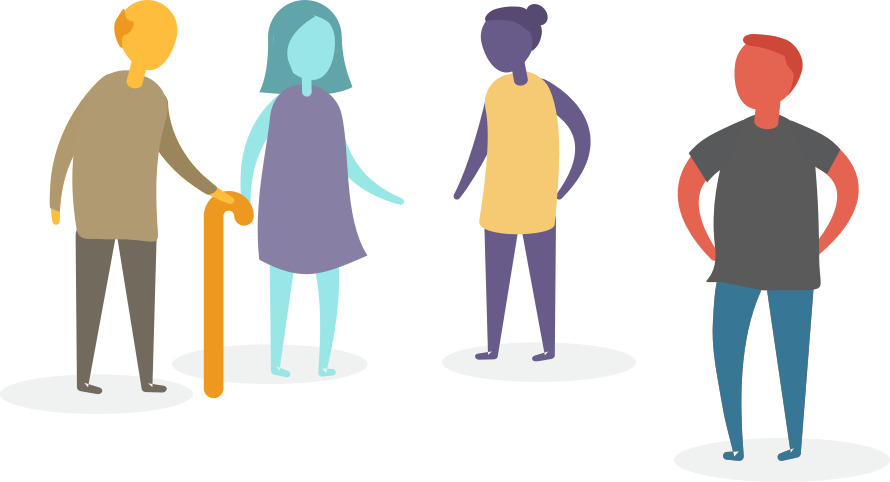Work &
Education
Work and education considerations
People with chronic kidney disease (CKD) are able to work and go to school. When kidney damage is mild, you may have a few symptoms that affect working or attending school. Continuing to work or go to school is encouraged, if possible. Having an opportunity to do so allows you to feel productive and capable, which is good for your happiness and quality of life. The information here is general in nature and does not cover all circumstances. Speak to a member of your health care team to assist you and your individual needs.
Tips to talk to your employer or educator
Talk to your employer or educator as soon as you feel your CKD is affecting your ability to do your job or attend school. Telling your employer or educator about your diagnosis is the only way to protect your legal right to any accommodations you might need at work or school. Only information relevant to the work situation needs to be shared. If you feel that you can handle your job or school responsibilities and will not require special considerations, you may choose not to share that you have CKD.
The following tips may help with this discussion with your employer:
- You only have to provide information about your health that will help your employer know what accommodations you need. You are not required to tell your employer other details about your health.
- Your employer is allowed to ask you for supporting documentation from a health care provider. They can also ask you to undergo a health assessment. This will help them understand your need for accommodations.
- If you are uncomfortable discussing your health with your manager at work, you might be able to involve a third party, like the human resources department at your work.
- Once you and your employer have decided on accommodations, you are required to do your work tasks effectively. It is up to you to tell your manager if your accommodations are not enough or if your needs at work change.
 Returning to work or school
Returning to work or school
Most people look forward to returning to work or school after a disability leave. It is a chance to get back to old routines. Sometimes the transition back to work or school can also be difficult. Whatever your situation, there are ways to help make your return as smooth as possible:
- Talk to your doctor about what to expect as you are recovering. For example, consider whether you will be able to manage all your previous work tasks or academic course load.
- If you will need accommodations in the workplace or school, talk with the relevant individuals in your work or school setting, such as your leave coordinator or service coordinator.
Some employers and educational institutions have programs to help you with your job or schoolwork if you are living with a disability. Your employer or school may offer the following:
- flexible work hours
- the option to work from home
- a job description that reflects your abilities
Your educational institution’s accessibility services department may offer the following:
- access to funding for disability-related supports and services for qualified students
- test and exam accommodations
- expertise in learning strategies
Studying when living with a disability
You may be eligible for programs, benefits, and services that help students living with a disability. A few other resources include:
- The Lifelong Learning Plan: The Lifelong Learning Plan allows you to withdraw amounts from your registered retirement savings plan (RRSP) to pay for training or education. Find out how to apply for the Lifelong Learning Plan.
- Severe permanent disability benefit: If you have a severe and permanent disability that will prevent you from working and studying for the rest of your life, you may apply to have your student loans cancelled. Learn how to apply for the severe permanent disability benefit.
- Canada Pension Plan (CPP) disability benefits and education: If you receive Canada Pension Plan (CPP) disability benefits, going to school won’t affect the amount of benefits you receive.
If you are unable to work or go to school
If you have a job but cannot work because of your CKD or you are caring for someone with CKD, you may be entitled to financial support. Many employers also offer disability insurance for people with disabilities. These benefits replace some of your regular income while you are unable to work, up to a limit. Your employer or insurance company will be able to provide more information.
Find out about disability benefits available to you through the Canadian government.
Resources
Government of Canada Resources:
- Working when living with a disability
Includes federal programs to assist workers with disabilities, including the Disability Vocational Rehabilitation Program, the Opportunities Fund, accessible transportation, and other considerations about receiving disability benefits when working. - Studying when living with a disability
Includes resources and considerations, including Registered Education Savings Plan (RESP), benefits to help pay for your education, such as the Lifelong Learning Plan, assistance paying student loans and help for students whose parents have a disability. - Education funding for people with disabilities
Benefits and grants for students with permanent disabilities. - Education Funding for Canadians
Provides information on available scholarships and budgeting tips.
Other Resources:
- The Job Accommodation Network
Information and guidance on workplace accommodations and disability-related employment issues.
